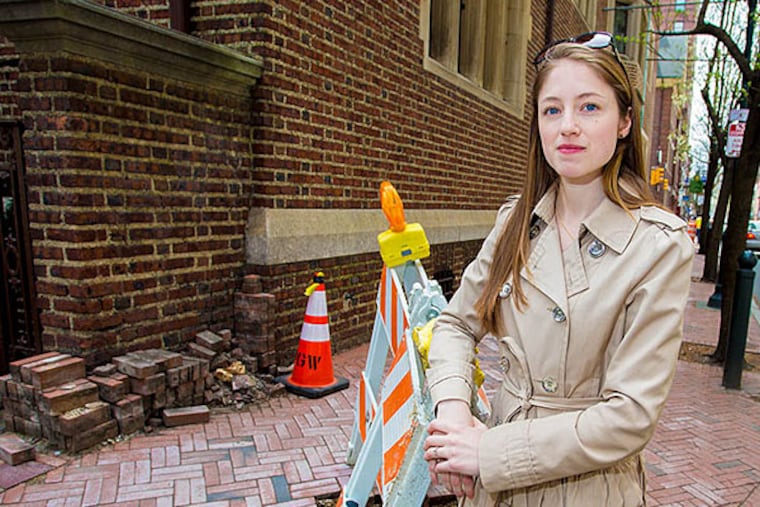Cone compatriot rides to the city's rescue
Philly woman, 28, turns into an @AwarenessCone to call attention to problems that need to be fixed.

PHILLY - home of the historic Liberty Bell, the iconic LOVE Park sign, the inspirational "Rocky" statue.
And, apparently, the orange safety cone.
Lots and lots of safety cones, if you follow @AwarenessCone, a new Twitter account calling attention to the ubiquitous cones that alert people to problems that may or may not get fixed.
A huge hole in a bike lane: Put a cone in it!
An inexplicable lake of water at a crosswalk: Watch your step and cone it!
The military may believe in leaving no man behind, but some utility workers don't seem to have the same allegiance to the cones they discard. No worries: The orphaned cones are quickly adopted by people who turn them into cones of immunity while saving parking spots or parking illegally.
"It's the Philly Shrug of infrastructure," said Victoria Harris, the creator of @AwarenessCone.
And here I thought I was alone in the barren wasteland that is Tweetadelphia complaining about wrongs no one wanted to right, coining the term Philly Shrug to call attention to residents dumping feces into the street, trees shooting out of crumbling homes, fights that people were faster to film than stop.
My cone compatriot and founding conehead is a 28-year-old city transportation and urban planner who loves the city she's lived in for close to six years.
"I have no intention of moving," she said. "I feel kind of a sense of impending responsibility to make sure that there is a city that I want to stay in and want to raise my kids in. I know people talk a lot about the schools, but it's not just the big things that make people move out, it's the constant little things that make people insane."
And the cones drive her and fellow coneheads from Philly to Australia crazy - as evidenced by all the photos they tweet her. Harris' frustration started with a huge hole in the bike lane at 22nd and Pine. Instead of fixing it, someone just put a cone in it. Yesterday, 20 days after Harris reported the hole to the city's 3-1-1 hotline, it was filled. Four orange cones stood guard on the sidewalk.
One cone led to another, and suddenly Harris started to notice them everywhere, around potholes and ditches, at construction sites, inexplicably placed in the middle of streets, ditched like litter in a city with more than its share.
"It seems like a trivial problem, but it's really an extension of a larger problem," she said. "Making sure that streets are safe and that sidewalks are safe for pedestrians, I mean, that's pretty basic stuff." But so is sending a message that the city cares enough to fix problems, not just alert the public to them, she said.
Although not all of the cones or the issues to which the cones are being used to alert passers-by fall under the city's Streets Department, many do, so I called Commissioner David Perri.
Perri said a range of issues are at play, including aging infrastructure and a few tough winters that have wreaked havoc on the streets. Last year, the department repaired a record 52,756 potholes and this year it is on track to beat that number, he said. (That doesn't include the active 3,000 ditches on city streets.) Ideally, it would love to have the budget to pave 130 miles of the city each year. But for the last three years, the department has been able to increase the miles it can fix. This year, it is paving 68 miles, and next year an estimated 85 miles.
Perri was perplexed by reports of abandoned cones. His employees will be disciplined for leaving them behind, he said. Apparently they're not cheap. Even in bulk, they're about $25 a pop.
But although he understood that people may not like the look of the cones, he said there is a "silver lining" to the many cones people are suddenly noticing. Long-overdue repairs are getting done, he said. Streets are being repaved. New construction is popping up all over the city.
"In a weird way, it's a sign of progress," he said.
When I told Harris this, she had only one question.
"At what point does it go from progress to a problem?" she asked. If a problem goes ignored for too long, it's not progress, period.
Unless . . . we go back to that silver lining that's so big in Philly. At the very least, these cones might be a valuable asset for mayoral candidates who have promised not to raise taxes. No need to raise taxes to buy orange cones, assuming there's a competitive bidding process. And they could put the cones in closed school libraries, dark nurses' offices, overcrowded classrooms.
When the Democratic National Convention and Pope Francis come to town, we could hand them a little statue of the Liberty Bell . . . or miniature orange cones. Tell me that tchotchke won't stand out.
The possibilities, my friends, are as plentiful as our cones.
Phone: 215-854-5943
On Twitter: @NotesFromHel